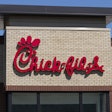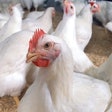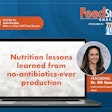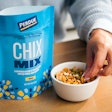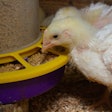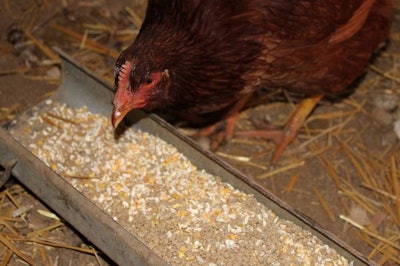
Chickens and turkeys, like all galliformes, are omnivores, they aren’t naturally herbivores. This natural diet containing insect and animal protein provided the right balance of amino acids for growth and reproduction. Vegetarian diets for poultry are deficient in the essential amino acid methionine and require supplementation with synthetic methionine, which has been restricted in the USDA’s Certified Organic program. Otherwise, the overfeeding of the bird’s total crude protein needs to meet the methionine requirement, which dramatically increases the cost of the ration.
There doesn’t appear to be a good option for U.S. organic poultry producers to choose, particularly if the option of methionine supplementation is restricted even further in the future. Dr. Paul Patterson, professor of poultry science at Pennsylvania State University, presented research into the viability of options for increasing the amount of methionine in organic poultry diets, but it appears there are no easy answers. He told the audience at the Organic Egg Farmers of America Symposium in St. Paul, Minnesota, that there are some crops and seed meals that have higher methionine concentrations than corn that might help, but there certainly isn’t anything available in quantity now that can solve the methionine problem.
Patterson reported on work with dehulled oats which can be substituted for corn in the ration as well as deshelled sunflower seed meal and Brazil nut meal which can be used to substitute for some of the soybean meal. As always with organic feeding programs, availability of organic supplies of these commodities is a problem. High methionine corn would be an ideal solution to this problem, but the varieties that are currently available don’t yield well in the field and lack the pest and disease resistance of the standard varieties of organic corn varieties.
Research with layers raised on pasture that is rotated every two days demonstrated that pasture, even in prime growing season in Pennsylvania with cattle on pasture prior to the hens, isn’t enough to supplement the hens’ methionine needs.
Creating an impossible standard
The question of how to meet an omnivore's nutritional needs feeding an all vegetarian diet is a question that I don’t think we should have to answer. What are we really gaining by trying to feed birds this way?
It appears to me that all we have done is create a standard that is impossible to meet. If the purpose of the standards is to keep the market niche for organic poultry meat and eggs restricted because of high cost, then restricting the use of synthetic methionine and animal protein sources will accomplish this.







